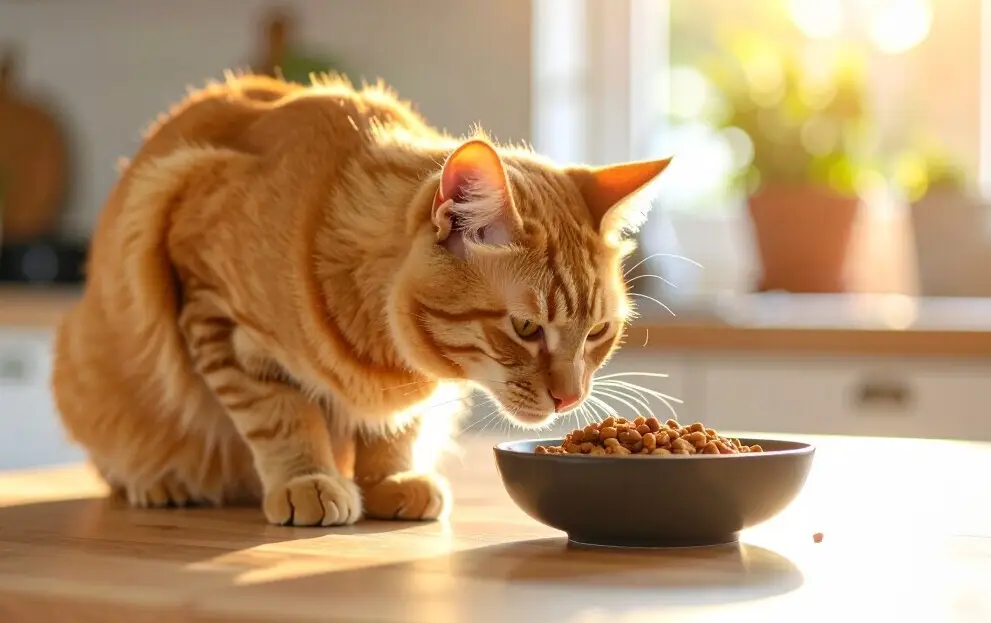If your cat struggles with urinary problems, you know how stressful it can be for both you and your feline friend. Specially designed probiotics can be a fantastic tool for supporting urinary health in cats. These formulas work behind the scenes to keep cats’ bladders healthy, help manage pH, and can even reduce the risk of future infections and discomfort. Probiotics are often easy to add to a daily routine, and for many cats, they can mean a happier, more comfortable life.
 How Probiotics Support Feline Urinary Health
How Probiotics Support Feline Urinary Health
I’ve seen so many cats benefit from probiotics, especially those tailored for urinary issues. The right strains help form a strong line of defense by balancing healthy bacteria in the gut and, in turn, supporting the urinary tract. Here’s how they work:
- Promoting Good Bacteria: Probiotics increase beneficial bacteria in the digestive system, which helps crowd out the bad stuff that can travel to the urinary tract.
- Balancing pH Levels: A stable pH in the bladder means fewer chances for crystals and bacteria to take hold.
- Boosting the Immune System: A healthy cat has a strong immune system ready to fight off infections, and probiotics help keep it in top shape.
- Reducing Inflammation: Cats with urinary issues often experience inflammation. Probiotics can sometimes help soothe irritated tissues by supporting overall gut and urine health.
This whole-body approach is pretty handy for any cat, but especially for those who are prone to stress-related urinary troubles or repeat infections. There are also studies showing that certain probiotic strains might help keep recurring bladder issues at bay by crowding out problem bacteria before they have a chance to cause problems. For pet parents, seeing their cat start using the litter box more comfortably again can be a huge relief.
Key Ingredients in Tailored Probiotic Formulas
Targeted probiotic blends for cats aren’t just a random mix of bacteria. Formulators aim for strains and nutrients supported by research for urinary health. When choosing a formula, here’s what I keep in mind:
- Specific Probiotic Strains: Lactobacillus reuteri and Enterococcus faecium are common in blends for urinary support. They’re known for their ability to discourage harmful bacteria and help balance pH.
- Cranberry Extract: You’ll see this a lot in urinary supplements. Cranberry makes it harder for bad bacteria to stick to the bladder walls.
- D-Mannose: This naturally occurring sugar is really good at helping flush unwanted stuff out of the urinary tract.
- Prebiotics (like FOS or inulin): Prebiotics serve as a snack for the probiotics, keeping them active and plentiful where it matters most.
Mixing these ingredients with gutfriendly bacterial strains creates a formula supporting both the digestive and urinary systems. It’s a double benefit that’s especially useful for cats with sensitive systems. Some formulas even add antioxidants or gentle herbal extracts for extra soothing effects. If your cat has allergies, look for labels indicating no artificial fillers to avoid any unwanted reactions.
Getting Started With Probiotics For Your Cat
Adding probiotics to your cat’s daily routine is actually pretty simple. Most options come in powder or capsule form and are flavorless or lightly flavored. Here’s my go-to approach:
- Pick a Vet-Recommended Brand: Not all probiotics are created equal. I stick with brands with good reviews from vets and real cat parents.
- Start Gradually: Mix a small amount into your cat’s food and watch for any changes. Giving too much at once can upset their stomach, so starting slow is key.
- Consistency is Key: Daily use provides reliable results. I try to make it part of the morning or evening feeding ritual.
- Watch For Positive Changes: Look for better litter box habits, less straining, or a general boost in mood. Sometimes, benefits take a couple of weeks to show up.
Before starting any supplement, I always check with my vet to see if probiotics are a good fit for my cat’s specific situation. Some cats with existing conditions need a bit more supervision when trying something new. If your household has multiple cats, introduce probiotics to all at the same time so routines stay steady and nobody gets left out. And remember to store the probiotics as directed, often in a cool, dry place to make sure the live cultures stick around.
What To Consider When Choosing a Probiotic
Walking down the supplement aisle can be a bit overwhelming. Here’s what I pay attention to for finding a solid urinary health probiotic for cats:
- Guaranteed Live CFUs: CFUs (colony forming units) basically tell you how much active bacteria is in the product. I look for brands that guarantee CFU counts through the expiration date, so I know the bacteria will still be alive and effective.
- Made for Cats: Formulas made specifically for felines are gentler on their unique digestive systems and usually use strains shown to work for cats (not just dogs or people).
- No Artificial Additives: I avoid anything with mystery flavors or colors. Simple ingredient lists bring more trust, in my experience.
- Good Manufacturing Practices: I keep an eye out for brands that have third-party testing or certifications. This means the label matches what’s inside the container, which is really important for safety and effectiveness.
Careful research helps buyers make informed decisions, so checking reviews and asking your vet for input is always a good call. Keep in mind the size of the probiotic serving and how it fits into your feeding schedule. Some cats prefer powder mixed into wet food, while others might accept a capsule treat or chew. Flexibility can help picky eaters get the support they need.
Veterinary-Formulated Vs. Over-the-Counter
There’s a difference between supplements put together by veterinarians and those you’ll find at a random pet store. Vet-formulated probiotics usually go through stricter checks and use strains known to be safe for cats. Over-the-counter picks can work too, but I always double-check the reputation of the product before using it with my cat. Consulting your vet before making a big change is never a bad move. They might have specific recommendations for your cat’s medical history or preference for certain brands based on the latest studies.
Everyday Tips For Cats Prone To Urinary Issues
Probiotics do a lot, but combining them with these extra steps can make a big impact on your cat’s comfort and well-being:
- Keep Water Bowls Full: Hydration helps flush the bladder naturally. Some cats love drinking from fountains, so it’s worth trying if your cat isn’t a big water drinker.
- Use Stress Reducing Tricks: Even small things, like providing hideaways and regular playtime, help lower stress levels that sometimes lead to urinary flare-ups.
- Cats Love Routine: Keeping feeding and litter box routines steady helps sensitive kitties stay calm and can reduce accidents.
Pairing these changes with tailored probiotics creates a friendly environment for cat urinary health. Don’t forget to clean litter boxes often; a fresh box motivates cats to use it regularly, lowering the risk of infections or unwanted behavior. If you’re introducing changes, do it gradually so your cat doesn’t get overwhelmed. Offer favorite treats and praise to encourage positive habits!

Frequently Asked Questions About Cat Probiotics for Urinary Health
How long does it take to see results from probiotics?
Most of the time, I notice a difference within two to four weeks Every cat is different, though. Some see changes sooner, while others take longer. Patience pays off, especially with sensitive cats or if you’re also switching diets. Keep a journal to track their progress if you’re unsure.
Are probiotics safe for all cats?
Most cats tolerate probiotics really well, but it’s always smart to check with your vet first, particularly with cats that have chronic illness or those taking other medications. In rare cases, a switch up in bowel habits may occur (like a softer stool), but this usually resolves as their system adjusts.
Can I give my cat human probiotics?
I wouldn’t recommend it. Cats need strains and doses tailored to their species, so picking a formula made just for felines is safer and more likely to work. Human products aren’t always tested on pets and could lack key strains needed for urinary health in cats.
Should I use probiotics long term?
Many cat parents use probiotics for long stretches, especially if the cat has recurrent urinary issues. Frequent check-ins with your veterinarian make sure it’s still the right approach. It’s important to take breaks as your vet advises, or try different formulas if your cat’s needs change.
What if my cat is picky about new foods?
Mixing a little probiotic with a favorite treat, or starting with just a pinch, can help finicky cats get used to it. Some tasty probiotic chews are available too for the pickiest eaters. Try serving it at different meal times to see when your cat prefers it most.
When To Talk To The Vet
Even though probiotics are pretty safe, I always keep my vet in the loop. Quick action is needed if a cat’s peeing outside the box, straining, or showing blood in the urine. Probiotics should be an add-on to a bigger urinary health plan, not a total replacement for vet care.
Probiotics designed for urinary health aren’t just about soothing one-off problems. They’re a gentle, practical way to help your cat feel their best over the long haul. By focusing on tailored blends, routine, and a little practical support around the house, it’s possible to help even the most sensitive cats stay healthy, happy, and comfortable every day. With all these steps, you’re giving your cat the tools to set free their best, healthiest self at home.
